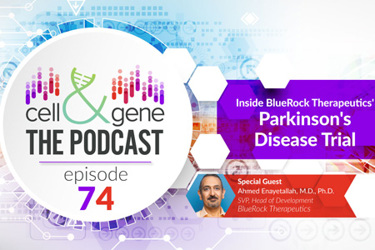Cell & Gene: The Podcast Post-Episode Recap: BlueRock Therapeutics' Dr. Ahmed Enayetallah

By Erin Harris, Editor-In-Chief, Cell & Gene
Follow Me On Twitter @ErinHarris_1

Cell & Gene: The Podcast features some of the CGT sector’s brightest leaders who share their expertise on the timeliest topics and trends. I know not everyone listens to podcasts, and even if you do, you may not get to every episode. So, I’ve created this article series, Cell & Gene: The Podcast Post-Episode Recap, which shares highlights, quotes, and more from recently aired episodes of Cell & Gene: The Podcast.
The Episode
Inside BlueRock Therapeutics' Parkinson's Disease Trial with Dr. Ahmed Enayetallah
Guest At-A-Glance
Dr. Ahmed Enayetallah obtained his medical degree from School of Medicine at University of Cairo in 1995 and his Ph.D. degree in Pharmacology & Toxicology from School of Pharmacy at University of Connecticut in 2006. Ahmed joined Biogen Idec in 2013, where his focus is to identify and implement innovative approaches to investigate clinical, radiographic, and molecular variables associated with neurodegenerative disease heterogeneity, severity, and progression trajectories. Prior to Biogen Idec, Ahmed worked at Pfizer Inc. where he served as the drug safety disease area lead for the Biotherapeutics Oncology Research Unit. At Pfizer, he was also a member of the Precision Medicine initiative leading patient stratification and response prediction studies in oncology and autoimmune diseases. Prior to Pfizer, Ahmed was the personalized medicine lead scientist at Genstruct Inc. (now Selventa Inc.), where he led the application of causal reasoning systems biology approaches to profile cancer patients for therapy prioritization. Prior to Genstruct, Ahmed was a post-doctoral fellow and assistant professor in Department of Pharmaceutical Sciences at University of Connecticut. Ahmed has over 50 research articles, abstracts, invited talks, and oral presentations.
Company At-A-Glance
BlueRock Therapeutics is a clinical stage cell therapy company and is a wholly owned, independently operated subsidiary of Bayer AG. BlueRock’s mission is to discover and develop cell therapies to treat degenerative diseases.
The Main Idea
Ahmed shares impressive data from BlueRock’s Phase 1 study designed to test whether surgically injecting nerve cells that make dopamine into the brain of Parkinson’s disease patients is safe, and to monitor for potential side effects. He also shares how Bemdaneprocel, BlueRock’s clinical stage drug product, is a stem cell-derived therapy that surgically transplants dopamine-producing neurons.
Episode Highlights
Focus on induced pluripotent stem cells (iPSCs)
According to the National Library of Medicine, induced pluripotent stem cells (IPSCs), are a type of pluripotent stem cell derived from adult somatic cells that have been genetically reprogrammed to an embryonic stem (ES) cell-like state through the forced expression of genes and factors important for maintaining the defining properties of ES cells. Indeed, BlueRock uses pluripotent stem cells (PSCs) to make highly specific cell types with the intention to replace those lost or damaged to disease. Pluripotent stem cells can self-renew or differentiate into specific cell types. Their pipeline and approach primarily focus on induced pluripotent stem cells (iPSC).
BlueRock’s Investigational Cell Therapy, Bemdaneprocel
BlueRock’s investigational cell therapy for treating Parkinson’s disease, bemdaneprocel, is derived from another type of PSC, human embryonic stem cells, and was well tolerated with no major safety issues in all 12 participants in low dose and high dose cohorts through one year. At the one-year mark, exploratory clinical endpoints improved overall with participants in the high dose cohort showing greater improvement. One year assessment of all participants demonstrated feasibility of transplantation, cell survival, and engraftment. A Phase 2 study is expected to begin enrolling participants this year.
Top Quotes
19:15: “We developed our own capabilities to be able to make the IPSCs and then differentiate them into virtually any cell type. That’s our platform. And then on top of that, we have what we call ‘cell plus gene platform.’ Not only you can make fresh healthy cells to replace lost cells or damage cells, but you can also actually modify or enhance them in a way that makes sense on what we’re trying to target.”
27:33: “I mentioned early immune suppression. We’re using cells that are not obtained from the same patient from the host. So, we have these cells, which we scale and produce. We have unlimited supply, but there is a concern, especially the building on some of the previous work, and that space and Parkinson’s that the body will reject the cells. And that could be a major challenge.”
There’s More Where That Came From
Do you like what you’ve read and what to learn more? Listen to the full-length episode to hear Dr. Ahmed Enayetallah’s insight on the future of Parkinson’s disease.
